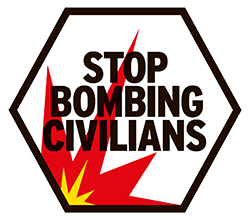How is HI’s advocacy team approaching the issue of the use of explosive weapons?
"To advance our cause, we’re focusing on four main approaches: we attend a lot of international meetings to discuss the bombing of civilians with State delegates. We’re going to take part in the First commission of the General Assembly of the United Nations (disarmament and international security) in New York this October, for example.
HI’s advocacy team also meet regularly with policymakers, the United Nations, ministers, members of parliaments, and so on. At the moment we’re intensively lobbying members of the French national assembly.
We regularly publish reports on the impact of the use of explosive weapons in populated areas and its consequences for civilians. Producing studies and sharing information is essential in calling States to account. It gives a solid grounding to our demands - an end to the use of explosive weapons in populated areas, and recognition of this practice as a serious humanitarian problem and of the need to assist victims.
Lastly, an essential aspect of our work is our concerted action with what we call the “core group” - a small group of States under Austrian leadership that meets every six months or so with civil society groups to develop a political declaration on ending the use of explosive weapons in populated areas."
Which is the best political framework to make progress on this issue?
"We’ve decided to support the work of the core group on developing a political declaration. We think it’s more suited to purpose than a treaty or convention - which is what our previous campaigns on anti-personnel mines and cluster munitions eventually achieved. It would be a non-binding, general political declaration that reiterates each party’s obligations under international humanitarian law and calls on States to review and share their military practices.
Some States like Germany seem to want discussions on the use of explosive weapons in populated areas to be held within the framework of the Convention on Certain Conventional Weapons[1]. We think it’s unlikely such discussions would have a tangible impact, since decisions must be reached by consensus, including with States that are highly reluctant to change their position on this issue. Our aim is to make tangible progress as quickly as possible."
How much progress have you made in your discussions with military actors - the people primarily responsible for the use of explosive weapons in populated areas?
"This is the other major challenge raised by our campaign: the military authorities believe they already take all necessary precautions to spare civilian lives and apply international humanitarian law. They are reluctant to share military practices.
On a positive note, if military actors do explain and detail their practices, they help us understand more about how they conduct operations when they use explosive weapons in populated areas.
This allows us to be more and more specific when we call armies or coalitions to account and ask for information and explanations on targeting, the choice of explosive weapon used, the type of data gathered to assess the risk to civilians, and so on.
Eventually, we hope to make them see how a political declaration on the use of explosive weapons in populated areas can help them better comply with their obligations under international humanitarian law."
[1]The Convention on Certain Conventional Weapons (CCW) came into force in 1983. It currently has 125 State Parties and 50 State Signatories. The purpose of the CCW is to ban or restrict the use of specific types of weapons that are considered to cause unnecessary or unjustifiable suffering to combatants or to affect civilians indiscriminately. It is a framework convention with annexed protocols.






